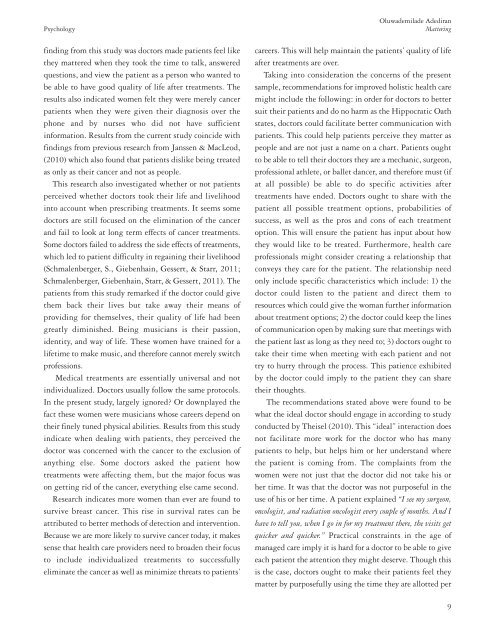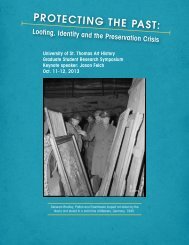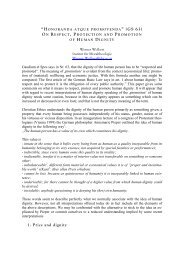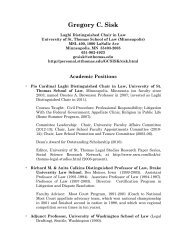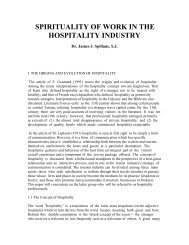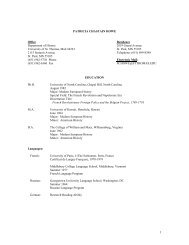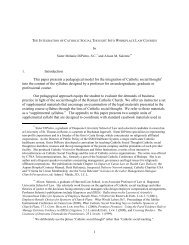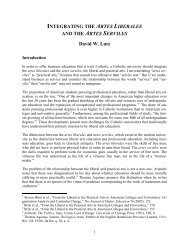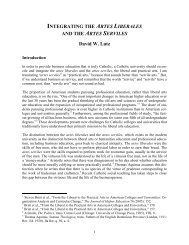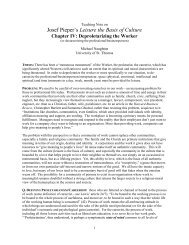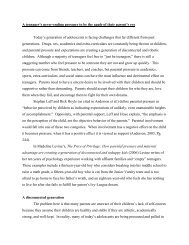dr. ronald e. mcnair acknowledgements - University of St. Thomas
dr. ronald e. mcnair acknowledgements - University of St. Thomas
dr. ronald e. mcnair acknowledgements - University of St. Thomas
Create successful ePaper yourself
Turn your PDF publications into a flip-book with our unique Google optimized e-Paper software.
Oluwademilade Adediran<br />
Psychology Mattering<br />
finding from this study was doctors made patients feel like<br />
they mattered when they took the time to talk, answered<br />
questions, and view the patient as a person who wanted to<br />
be able to have good quality <strong>of</strong> life after treatments. The<br />
results also indicated women felt they were merely cancer<br />
patients when they were given their diagnosis over the<br />
phone and by nurses who did not have sufficient<br />
information. Results from the current study coincide with<br />
findings from previous research from Janssen & MacLeod,<br />
(2010) which also found that patients dislike being treated<br />
as only as their cancer and not as people.<br />
This research also investigated whether or not patients<br />
perceived whether doctors took their life and livelihood<br />
into account when prescribing treatments. It seems some<br />
doctors are still focused on the elimination <strong>of</strong> the cancer<br />
and fail to look at long term effects <strong>of</strong> cancer treatments.<br />
Some doctors failed to ad<strong>dr</strong>ess the side effects <strong>of</strong> treatments,<br />
which led to patient difficulty in regaining their livelihood<br />
(Schmalenberger, S., Giebenhain, Gessert, & <strong>St</strong>arr, 2011;<br />
Schmalenberger, Giebenhain, <strong>St</strong>arr, & Gessert, 2011). The<br />
patients from this study remarked if the doctor could give<br />
them back their lives but take away their means <strong>of</strong><br />
providing for themselves, their quality <strong>of</strong> life had been<br />
greatly diminished. Being musicians is their passion,<br />
identity, and way <strong>of</strong> life. These women have trained for a<br />
lifetime to make music, and therefore cannot merely switch<br />
pr<strong>of</strong>essions.<br />
Medical treatments are essentially universal and not<br />
individualized. Doctors usually follow the same protocols.<br />
In the present study, largely ignored? Or downplayed the<br />
fact these women were musicians whose careers depend on<br />
their finely tuned physical abilities. Results from this study<br />
indicate when dealing with patients, they perceived the<br />
doctor was concerned with the cancer to the exclusion <strong>of</strong><br />
anything else. Some doctors asked the patient how<br />
treatments were affecting them, but the major focus was<br />
on getting rid <strong>of</strong> the cancer, everything else came second.<br />
Research indicates more women than ever are found to<br />
survive breast cancer. This rise in survival rates can be<br />
attributed to better methods <strong>of</strong> detection and intervention.<br />
Because we are more likely to survive cancer today, it makes<br />
sense that health care providers need to broaden their focus<br />
to include individualized treatments to successfully<br />
eliminate the cancer as well as minimize threats to patients’<br />
careers. This will help maintain the patients’ quality <strong>of</strong> life<br />
after treatments are over.<br />
Taking into consideration the concerns <strong>of</strong> the present<br />
sample, recommendations for improved holistic health care<br />
might include the following: in order for doctors to better<br />
suit their patients and do no harm as the Hippocratic Oath<br />
states, doctors could facilitate better communication with<br />
patients. This could help patients perceive they matter as<br />
people and are not just a name on a chart. Patients ought<br />
to be able to tell their doctors they are a mechanic, surgeon,<br />
pr<strong>of</strong>essional athlete, or ballet dancer, and therefore must (if<br />
at all possible) be able to do specific activities after<br />
treatments have ended. Doctors ought to share with the<br />
patient all possible treatment options, probabilities <strong>of</strong><br />
success, as well as the pros and cons <strong>of</strong> each treatment<br />
option. This will ensure the patient has input about how<br />
they would like to be treated. Furthermore, health care<br />
pr<strong>of</strong>essionals might consider creating a relationship that<br />
conveys they care for the patient. The relationship need<br />
only include specific characteristics which include: 1) the<br />
doctor could listen to the patient and direct them to<br />
resources which could give the woman further information<br />
about treatment options; 2) the doctor could keep the lines<br />
<strong>of</strong> communication open by making sure that meetings with<br />
the patient last as long as they need to; 3) doctors ought to<br />
take their time when meeting with each patient and not<br />
try to hurry through the process. This patience exhibited<br />
by the doctor could imply to the patient they can share<br />
their thoughts.<br />
The recommendations stated above were found to be<br />
what the ideal doctor should engage in according to study<br />
conducted by Theisel (2010). This “ideal” interaction does<br />
not facilitate more work for the doctor who has many<br />
patients to help, but helps him or her understand where<br />
the patient is coming from. The complaints from the<br />
women were not just that the doctor did not take his or<br />
her time. It was that the doctor was not purposeful in the<br />
use <strong>of</strong> his or her time. A patient explained “I see my surgeon,<br />
oncologist, and radiation oncologist every couple <strong>of</strong> months. And I<br />
have to tell you, when I go in for my treatment there, the visits get<br />
quicker and quicker.” Practical constraints in the age <strong>of</strong><br />
managed care imply it is hard for a doctor to be able to give<br />
each patient the attention they might deserve. Though this<br />
is the case, doctors ought to make their patients feel they<br />
matter by purposefully using the time they are allotted per<br />
9


